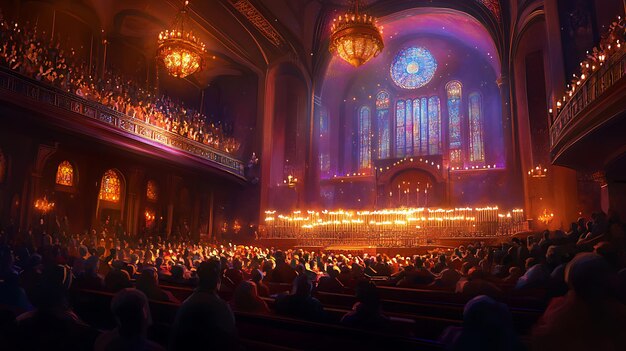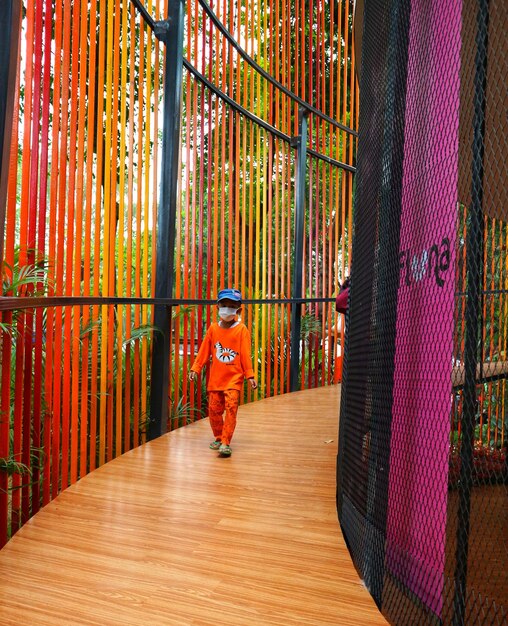Beyond Broadway: 6 Regional Theater Gems Showcasing American Stories

Advertisements
Regional theaters across the United States are vital cultural hubs, offering diverse narratives and innovative productions that resonate deeply with local communities, providing a compelling alternative to mainstream Broadway shows while showcasing authentic American stories.
While Broadway casts a long, celebrated shadow over the American theatrical landscape, its allure often overshadows the vibrant, innovative work happening in regional theaters across the nation. Beyond the bright lights of Times Square lies a rich tapestry of stages dedicated to telling unique American stories, fostering local talent, and engaging communities in profound ways. This article explores six remarkable regional theater gems that exemplify the diverse artistry and powerful storytelling found when we venture Beyond Broadway: Uncovering 6 Regional Theater Gems Showcasing American Stories.
The Enduring Significance of Regional Theater
Regional theater companies are more than just performance venues; they are cultural institutions, economic engines, and vital platforms for artistic expression. They serve as crucibles for new works, often premiering plays that later make their way to broader recognition, including Broadway itself. These theaters cultivate a direct relationship with their audiences, reflecting local concerns, histories, and dreams, thereby enriching the cultural fabric of their respective regions.
The commitment to artistic risk-taking is a hallmark of regional theater. Without the intense commercial pressures of Broadway, these companies often have the freedom to explore challenging themes, experiment with new forms, and champion underrepresented voices. This creative liberty leads to a dynamic and diverse theatrical ecosystem, one that is constantly evolving and pushing boundaries. It’s where the next great American play is often born, nurtured away from the glare of national spotlights.
Fostering New American Voices
One of the most significant contributions of regional theaters is their dedication to developing and premiering new plays. Many theaters have robust new play development programs, residencies for playwrights, and festivals dedicated to showcasing emerging talent. This commitment ensures a continuous influx of fresh narratives that reflect the complexities of contemporary American life.
- Regional theaters act as incubators for playwrights, offering workshops and staged readings.
- They provide a supportive environment for experimental and boundary-pushing scripts.
- Often, these theaters commission new works inspired by local history or social issues.
- Premiere productions gain critical feedback essential for a play’s evolution.
The impact of this focus on new works extends far beyond the theater itself, influencing the national theatrical canon and sparking important conversations within communities. It’s where stories that might otherwise go untold find a stage, connecting with audiences on a deeply personal level.
Furthermore, regional theaters serve as crucial training grounds for actors, directors, designers, and technicians. Many professionals start their careers in these companies, honing their craft before potentially moving on to larger stages or film. This creates a sustainable pipeline of talent, ensuring the future vitality of American theater.
The Guthrie Theater, Minneapolis, Minnesota
Perched majestically on the banks of the Mississippi River, the Guthrie Theater in Minneapolis is an architectural marvel and a theatrical powerhouse. Founded in 1963 by Sir Tyrone Guthrie, it was one of the earliest and most successful attempts to create a major repertory theater outside of New York City. The Guthrie has consistently upheld a commitment to classic plays alongside contemporary works, often presenting fresh interpretations that challenge audience perceptions.
Its distinctive three-stage complex allows for a diverse range of productions simultaneously, from intimate experimental pieces to grand-scale classical dramas. The theater has been instrumental in shaping the cultural identity of the Midwest, attracting world-class talent and drawing audiences from across the country. The Guthrie exemplifies the potential for regional theater to achieve national and international acclaim while remaining deeply rooted in its community.
A Legacy of Excellence
The Guthrie’s illustrious history includes groundbreaking productions and a roster of eminent artists. Its innovative approach to production design and its willingness to take artistic risks have cemented its reputation as a leading American theater. From its early days, the Guthrie sought to defy the commercial pressures of Broadway, focusing instead on artistic integrity and a rigorous repertory model.
- The theater boasts a rich archive of past productions, showcasing its artistic evolution.
- It has hosted countless world and American premieres of significant plays.
- Educational programs are offered, engaging the next generation of theatergoers and professionals.
- The Guthrie’s resident acting company brings consistency and depth to its performances.
The commitment to artistic excellence translates into productions of the highest caliber, often employing unique staging techniques and ambitious design. The Guthrie experience is not just about watching a play; it’s about being immersed in a meticulously crafted artistic vision.
Beyond its main stages, the Guthrie is also deeply involved in community engagement, offering various outreach programs and educational initiatives. This commitment ensures that the transformative power of theater reaches a broad audience, fostering a deeper appreciation for the arts within Minnesota and beyond.
Steppenwolf Theatre Company, Chicago, Illinois
From its humble beginnings in a church basement in 1976, the Steppenwolf Theatre Company in Chicago has grown into one of the most influential and respected theater companies in the world. Known for its intense, ensemble-driven performances and its raw, unflinching approach to storytelling, Steppenwolf has developed a distinctive aesthetic often described as “ensemble acting at its finest.” Many of its founding members and long-term ensemble artists have gone on to achieve significant fame in Hollywood and on Broadway, yet the heart of the company remains in Chicago.
Steppenwolf’s productions often tackle challenging social issues with a gripping realism that resonates deeply with audiences. Their work frequently blends dark humor with profound emotional truths, creating theatrical experiences that are both unsettling and deeply moving. The sheer dedication and visceral commitment of its ensemble actors set Steppenwolf apart, creating a shared language and chemistry that elevates every performance.
The Power of Ensemble
The core of Steppenwolf’s success lies in its steadfast commitment to the ensemble model. This approach fosters a collaborative environment where actors, writers, and directors work together over long periods, developing a profound understanding of each other’s artistic sensibilities. This deep connection allows for nuanced, cohesive performances that are rarely seen in theaters without a permanent ensemble.
- Ensemble members collectively shape the artistic direction and mission of the company.
- The shared history of the ensemble enriches the performance chemistry on stage.
- It encourages artistic risks and pushes actors beyond their individual comfort zones.
- The model supports long-term artistic development and sustained creative output.

Steppenwolf productions are often characterized by their immersive nature, pulling the audience into the world of the play with an undeniable force. Whether it’s a new work or a reimagining of a classic, their performances are always memorable, leaving a lasting impression long after the curtain falls.
Moreover, Steppenwolf is a strong proponent of educational initiatives, reaching out to young people through various programs designed to introduce them to the transformative power of theater. This commitment to nurturing future talent and audiences underscores its role as a vital cultural institution in Chicago and beyond.
Oregon Shakespeare Festival, Ashland, Oregon
Nestled in the picturesque town of Ashland, Oregon, the Oregon Shakespeare Festival (OSF) is a remarkable institution that, despite its name, presents a diverse repertoire of plays far beyond the works of Shakespeare. Founded in 1935, OSF has evolved into one of the oldest and largest regional theater festivals in the United States. Its commitment to artistic excellence, historical accuracy, and contemporary relevance makes it a unique destination for theater lovers.
OSF’s season typically runs for nine months, featuring a rotating repertory of classic and new works across three distinct theaters. This includes an authentic outdoor Elizabethan stage, providing an unparalleled experience for Shakespearean plays under the stars. The festival is renowned for its exceptional acting company, stunning costume design, and innovative approaches to classic texts, often drawing parallels to modern societal issues.
A Blend of Tradition and Innovation
What sets OSF apart is its ability to honor the rich tradition of classical theater while simultaneously embracing contemporary narratives and experimental forms. It’s a place where a profound exploration of Shakespeare can exist alongside the world premiere of a modern American story, creating a compelling dialogue between past and present.
- The festival maintains rigorous standards for historical research in its classical productions.
- It actively commissions and develops new plays that often have a social justice focus.
- OSF is a leader in inclusive casting practices, promoting diversity on stage.
- The educational programs at OSF reach thousands of students annually.
The atmosphere in Ashland during the festival season is electric, with theatergoers from all over the globe converging to experience world-class performances. The dedication of the artists and staff to their craft is palpable, resulting in productions that are both intellectually stimulating and emotionally resonant.
Beyond the stages, OSF has also become a cultural anchor for the region, contributing significantly to the local economy and fostering a vibrant artistic community. Its impact on American theater history is undeniable, continually pushing the boundaries of what a classical theater festival can achieve.
Arena Stage, Washington, D.C.
Located in the nation’s capital, Arena Stage has been a cornerstone of American theater since its founding in 1950. It’s recognized as one of the first resident theaters to emerge in the United States and has played a pivotal role in establishing the regional theater movement. Arena Stage is celebrated for its commitment to developing and producing American plays and playwrights, often exploring themes of identity, social justice, and the American experience.
The theater operates three distinct performance spaces within its stunning Mead Center for American Theater, offering flexibility for a wide array of productions. Arena Stage has a long history of premiering works by significant American playwrights, many of which have gone on to New York stages and critical acclaim. Its proximity to the nation’s political heart allows it to engage with timely and relevant topics, often sparking important public discourse.
Championing American Playwriting
Arena Stage stands out for its unwavering dedication to the American voice. Its mission explicitly emphasizes the support of American artists and the creation of a uniquely American theatrical repertoire. This focus ensures that the narratives presented on its stages reflect the diverse and complex stories of the country.
- Arena Stage has been a launching pad for numerous Pulitzer Prize-winning plays.
- It hosts various playwrighting initiatives and workshops fostering new talent.
- The company actively seeks out collaborative projects with other American theaters.
- Its productions frequently highlight historical or contemporary events relevant to the American narrative.
The theater’s impact on American playwriting cannot be overstated. By consistently providing a platform for new and established American writers, Arena Stage has significantly contributed to the richness and diversity of the national dramatic canon. Their rigorous development process ensures that plays are fully realized and ready for broader audiences.
Furthermore, Arena Stage is deeply embedded in the cultural life of Washington, D.C., offering extensive community programs and educational opportunities. Known for its strong commitment to civic engagement through theater, it uses the stage to foster dialogue and understanding among its diverse audience members.
La Jolla Playhouse, La Jolla, California
Founded in 1947 by Hollywood legends Gregory Peck, Dorothy McGuire, and Mel Ferrer, La Jolla Playhouse in San Diego, California, has earned a reputation as one of the country’s most prolific producers of new works. Known affectionately as a “Broadway launching pad,” the Playhouse has sent an extraordinary number of productions to New York, many of which have gone on to win Tony Awards and achieve critical and commercial success. Its stunning coastal location provides an inspiring backdrop for its innovative theatrical endeavors.
La Jolla Playhouse’s work is characterized by its bold artistic choices, its embrace of new technologies in staging, and its commitment to diverse storytelling. The theater is not afraid to experiment with form and content, often resulting in productions that are both visually spectacular and emotionally profound. Their strong focus on developing new musicals has particularly made an impact on the national theater scene, giving birth to many beloved shows.
Incubator for Innovation
The Playhouse’s primary strength lies in its role as a leading incubator for new plays and musicals. It offers a crucial space for works to be developed, refined, and staged before potentially moving to larger, more commercial venues. This nurturing environment is essential for the often-complex process of bringing a new piece of theater to life.
- La Jolla Playhouse consistently premieres groundbreaking musicals and plays.
- It engages with cutting-edge theatrical technology and design.
- The institution attracts top-tier talent from across the country for its productions.
- Its new play development program is a model for regional theaters nationwide.

The impact of La Jolla Playhouse on Broadway has been immense, arguably more so than any other regional theater. This constant flow of critically acclaimed new works demonstrates its unparalleled ability to identify and cultivate theatrical excellence. Audiences often catch a glimpse of future Broadway hits right here on the West Coast.
Beyond its main stage, the Playhouse maintains a deep commitment to its surrounding community, offering educational programs for all ages and engaging with local artists. Its influence extends far beyond the stage, fostering a robust appreciation for the arts in Southern California.
Trinity Repertory Company, Providence, Rhode Island
The Trinity Repertory Company in Providence, Rhode Island, is an acclaimed resident theater known for its deep commitment to its ensemble acting company and its innovative adaptations of classic plays. Founded in 1964 as one of the first regional theaters in the United States, Trinity Rep has consistently pushed artistic boundaries, earning a Pulitzer Prize for Drama for its collaborative work. Its historical building, a former vaudeville house, provides a unique and atmospheric setting for its performances.
Trinity Rep’s hallmark is its resident ensemble of actors and an artistic leadership that often encourages experimental interpretations of theatrical staples. This allows for a unique institutional continuity and a shared artistic language that permeates every production. The company often delves into community-specific narratives while maintaining a strong tradition of classical theatrical performance, creating a dynamic blend that is both locally resonant and universally appealing.
The Ensemble’s Creative Core
Much like Steppenwolf, Trinity Rep’s strength is rooted in its ensemble approach. This model fosters artistic continuity and allows for a deeper exploration of roles and texts over time. The shared history and understanding among the ensemble members translate into performances that are incredibly cohesive and richly textured.
- The ensemble approach allows for a sustained artistic vision and evolution.
- Actors often take on diverse roles, showcasing their range and versatility.
- The long-term collaboration fosters a unique theatrical chemistry.
- Educational programs are often integrated with the ensemble’s work, providing mentorship.
Trinity Rep consistently delivers productions that are both intellectually stimulating and emotionally powerful. Their ability to take well-known stories and infuse them with new relevance, often through contemporary lenses, is a testament to the creativity of their ensemble and artistic team. Audiences are consistently challenged and moved by the thought-provoking nature of their work.
In addition to its mainstage productions, the company is deeply integrated into the cultural life of Rhode Island, offering extensive educational programs and outreach initiatives. Trinity Rep’s commitment to theatrical innovation and community engagement makes it a truly special regional theater that continues to shape the American theatrical landscape.
South Coast Repertory, Costa Mesa, California
Established in 1964, South Coast Repertory (SCR) in Costa Mesa, California, is one of the nation’s leading centers for new play development. Over its storied history, SCR has premiered more than 100 plays, with many subsequently produced throughout the United States and abroad, earning the theater a Tony Award for its contribution to new works. Its vibrant location in Orange County allows it to serve a diverse and engaged audience, eager for innovative theatrical experiences.
SCR is celebrated for its meticulous production values, its commitment to supporting playwrights through various residency programs, and its impressive record of contributing to the American dramatic canon. The theater champions a wide range of voices and styles, ensuring that its stages reflect the rich tapestry of American life. Its strong connection with the local community, combined with its national significance in new play development, makes it a unique and powerful cultural force.
A Hub for New Play Development
South Coast Repertory’s reputation as a new play powerhouse is well-earned. The theater invests significantly in playwrights, providing them with the resources, time, and collaborative environment necessary to bring their visions to life. This dedication has resulted in a wealth of significant new American plays making their debut on SCR’s stages.
- SCR has a dedicated NewSCRipts series for readings of works in progress.
- It offers commissions and residencies for emerging and established playwrights.
- The theater often stages world premieres that go on to national prominence.
- Educational workshops are provided, nurturing the next generation of playwrights.
The impact of SCR on American theater is profound. By consistently nurturing and launching new plays, it ensures the vitality and evolution of the dramatic form. Many of the plays that explore the most pressing issues of our time find their first home at South Coast Repertory, allowing audiences to engage with cutting-edge storytelling.
Beyond its new play focus, SCR also maintains an active community engagement program, including a highly regarded theater conservatory for young people. This holistic approach ensures that the arts are accessible and inspiring to a wide demographic, cementing the theater’s important role in its community.
| Key Aspect | Brief Description |
|---|---|
| 🎭 Regional Significance | These theaters are vital cultural hubs, deeply rooted in their local communities. |
| ✨ Artistic Innovation | They foster new works and creative interpretations of classics, unburdened by commercial pressure. |
| 📚 Storytelling Diversity | They showcase authentic American stories, often reflecting local histories and social issues. |
| 🚀 Talent Incubation | Many serve as launching pads for actors, playwrights, and productions to broader acclaim. |
Frequently Asked Questions
▼
A regional theater, also known as a resident theater, is a professional non-profit theater company located outside of New York City. Unlike Broadway, which often has limited runs, regional theaters typically maintain a season of productions, engage with local communities, and frequently focus on new play development or fresh interpretations of classics. They are crucial for decentralizing American theater.
▼
Regional theaters are vital for American stories because they provide a platform for narratives that reflect the diverse experiences and histories of specific communities across the country. They often commission local playwrights, explore regional themes, and engage with contemporary social issues, offering a broader and more nuanced portrayal of American life than what is typically seen on commercial stages.
▼
Yes, many regional theaters serve as critical incubators for new plays and musicals that often transfer to Broadway. La Jolla Playhouse, for instance, is famously known as a “Broadway launching pad,” having sent numerous shows, including many Tony Award winners, to New York. This highlights regional theaters’ crucial role in developing and refining productions before they reach a wider commercial audience.
▼
Supporting your local regional theater can be done in several ways. You can purchase tickets to attend their performances regularly, subscribe to their season, or make a direct financial donation. Many theaters also rely on volunteers for various roles, from ushering to administrative tasks. Spreading the word to friends and family and engaging with their social media are also valuable forms of support.
▼
Generally, yes. Regional theater tickets are often significantly more affordable than Broadway tickets, making live theater more accessible to a broader audience. While prices vary by theater and production, regional companies typically have a different funding model and less commercial pressure, allowing them to offer more budget-friendly options, including subscriptions and student discounts, which helps foster a consistent local audience.
Conclusion
The American theatrical landscape is vastly richer and more diverse than what is often perceived through the lens of Broadway alone. The regional theater companies highlighted here—the Guthrie, Steppenwolf, Oregon Shakespeare Festival, Arena Stage, La Jolla Playhouse, and Trinity Repertory Company, along with South Coast Repertory—represent just a fraction of the incredible talent, innovation, and dedication found in communities across the United States. These institutions are not merely stages; they are cultural anchors, developing new works, nurturing artists, and telling the myriad American stories that resonate deeply with local and national audiences. Exploring these regional gems offers a profound, authentic, and often groundbreaking experience of live theater, proving that the heart of American drama beats vibrantly far beyond the Great White Way.





